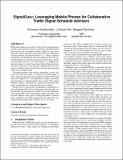| dc.contributor.author | Koukoumidis, Emmanouil | |
| dc.contributor.author | Peh, Li-Shiuan | |
| dc.contributor.author | Martonosi, Margaret | |
| dc.date.accessioned | 2012-08-30T17:40:42Z | |
| dc.date.available | 2012-08-30T17:40:42Z | |
| dc.date.issued | 2011-06 | |
| dc.identifier.isbn | 978-1-4503-0643-0 | |
| dc.identifier.uri | http://hdl.handle.net/1721.1/72478 | |
| dc.description.abstract | While traffic signals are necessary to safely control competing flows of traffic, they inevitably enforce a stop-and-go movement pattern that increases fuel consumption, reduces traffic flow and causes traffic jams. These side effects can be alleviated by providing drivers and their onboard computational devices (e.g., vehicle computer, smartphone) with information about the schedule of the traffic signals ahead. Based on when the signal ahead will turn green, drivers can then adjust speed so as to avoid coming to a complete halt. Such information is called Green Light Optimal Speed Advisory (GLOSA). Alternatively, the onboard computational device may suggest an efficient detour that will save the driver from stops and long waits at red lights ahead.
This paper introduces and evaluates SignalGuru, a novel software service that relies solely on a collection of mobile phones to detect and predict the traffic signal schedule, enabling GLOSA and other novel applications. Our SignalGuru leverages windshield-mounted phones to opportunistically detect current traffic signals with their cameras, collaboratively communicate and learn traffic signal schedule patterns, and predict their future schedule.
Results from two deployments of SignalGuru, using iPhones in cars in Cambridge (MA, USA) and Singapore, show that traffic signal schedules can be predicted accurately. On average, SignalGuru comes within 0.66s, for pre-timed traffic signals and within 2.45s, for traffic-adaptive traffic signals. Feeding SignalGuru's predicted traffic schedule to our GLOSA application, our vehicle fuel consumption measurements show savings of 20.3%, on average. | en_US |
| dc.description.sponsorship | National Science Foundation (U.S.). (Grant number CSR-EHS-0615175) | en_US |
| dc.description.sponsorship | Singapore-MIT Alliance for Research and Technology Center. Future Urban Mobility | en_US |
| dc.language.iso | en_US | |
| dc.publisher | Association for Computing Machinery (ACM) | en_US |
| dc.relation.isversionof | http://dx.doi.org/10.1145/1999995.2000008 | en_US |
| dc.rights | Creative Commons Attribution-Noncommercial-Share Alike 3.0 | en_US |
| dc.rights.uri | http://creativecommons.org/licenses/by-nc-sa/3.0/ | en_US |
| dc.source | Other University Web Domain | en_US |
| dc.title | SignalGuru: Leveraging mobile phones for collaborative traffic signal schedule advisory | en_US |
| dc.type | Article | en_US |
| dc.identifier.citation | Emmanouil Koukoumidis, Li-Shiuan Peh, and Margaret Rose Martonosi. 2011. SignalGuru: leveraging mobile phones for collaborative traffic signal schedule advisory. In Proceedings of the 9th international conference on Mobile systems, applications, and services (MobiSys '11). ACM, New York, NY, USA, 127-140. | en_US |
| dc.contributor.department | Massachusetts Institute of Technology. Computer Science and Artificial Intelligence Laboratory | en_US |
| dc.contributor.approver | Peh, Li-Shiuan | |
| dc.contributor.mitauthor | Peh, Li-Shiuan | |
| dc.relation.journal | Proceedings of the 9th international conference on Mobile systems, applications, and services (MobiSys '11) | en_US |
| dc.eprint.version | Author's final manuscript | en_US |
| dc.type.uri | http://purl.org/eprint/type/ConferencePaper | en_US |
| dspace.orderedauthors | Koukoumidis, Emmanouil; Peh, Li-Shiuan; Martonosi, Margaret Rose | en |
| dc.identifier.orcid | https://orcid.org/0000-0001-9010-6519 | |
| mit.license | OPEN_ACCESS_POLICY | en_US |
| mit.metadata.status | Complete | |

